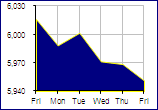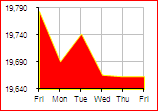Old Politics vs New Economy
Former PM Deve Gowda has stirred the hornet's nest this time by blaming Infosys Mentor Narayan Murthy of making nil contribution towards the international airport in Bangalore. He further accused IT firms, and named Infosys, of grabbing land belonging to "poor,humble farmers" (link). Murthy, of course decided that enough is enough of this and resigned from the chairmanship of the Bangalore International Airport Limited. Further, Infosys provided the detailed account of all the acquisitions, removing all doubts about land grabbing. Gowda perhaps didn't expect that tables will turn on him like this and is now forced to eat the humble pie.
Shekhar Gupta has done a very interesting analysis of the whole issue in his column in Indian Express (Old Politics vs New Economy) -
This is no clash of personalities or egos. In a reforming Indian economy, this is our first experience of an inevitable clash, between old politics and new economy. Our traditional old politician was at peace with the old economy, where the businessman depended on him for licences, quotas, permissions and clearances and then, to protect him from the extortionist inspector raj and finally, to keep the taxman and other likely raiders off his back. The new economy businesses need none of that.I think Gupta has been spot on in his analysis, but it might take some time before the vacuous politicians' bluff is called by the voters. In a democracy where a vote is as cheap as a bottle of alcohol or few hundred rupees, phoney leaders are bound to get elected. Moreover, since Gowda dons the cloak of Robin Hood to fool the voters (I'm here to save you from evil capitalist designs), his predominently rural vote bank would hear only his side of the story. The contribution made by Murthy and likes are not as explicit as ones *claimed* by the Gowdas. It's really ironic that Gowda must accuse Infosys or other IT firms of grabbing land; here in Bangalore one hears quite often about the land grabbed by Gowda and his sons!
The IT ministry came up before our political class thought of even setting up an IT ministry. The political class has never quite accepted this. Given half a chance, it would have tried to "rectify" this, by bringing the regulation and restrictions into the sector so that it could somehow acquire discretionary powers. That it can do no such thing, given the iconic status the new economy has acquired, its capacity to generate wealth — and jobs — and the international recognition it has achieved, must be galling for the practitioner of old politics. This is just the sentiment Gowda is reflecting. The mutually comfortable arrangement of the old economy was underlined so profoundly by the late Dhirubhai Ambani in an interview to T.N. Ninan (then at India Today) with his immortal "I will salaam anybody" quote. So dramatically has the situation changed today that both his sons would tell you they no longer need to call on anybody in Delhi for anything.
That is not the equation politicians of Gowda's generation relish. They are loathe to cede the power space to the entrepreneur like this. They still see the businessman as the archetypal "sethji", or "lala", who has to wait outside their door and pay their personal and political bills. The new economy has demolished that paradigm. It needs almost nothing from the government, except decent infrastructure wherever they are based, and some land which, in our country, is still either controlled by the government, or must be acquired by it. This is the one power old politics still has and this is what Gowda has seized upon. Hence the attack on Murthy is to do with real estate — his motivation is to grab real estate and make profits in it ("at the cost of the poor farmers") rather than expand an enterprise that will create more jobs, wealth, taxes and prestige.
But I would reckon Gowda is too shrewd not to know this won't work in the long run, that nobody, even the most destitute farmer whose behalf he pretends to speak on, will buy any of this. Fifteen years of reform may not have drawn out all of the socialist venom in our systems but they have brought about enough change so that it is no longer so easy to paint a Murthy, a Tata, a Premji or an Ambani as mere capitalist usurpers and to turn the jobless millions on them. The new India loves and cherishes its entrepreneurs (capitalists?) more than it trusts its politicians.
Gowda is now wallowing in his own isolation and irrelevance and taking his frustration out in a totally lost cause (for himself and the old politics he personifies) on the one man the rich and the poor all adore and the one industry the right and the left of our politics both love, and woo desperately. So here is my final argument and prediction: another hall-mark of our old politics was the cynical realism of its practitioners. It's a matter of time before this truth dawns on our youngest former prime minister as well and you'd see him cutting his losses and back-tracking, if only the Congress would stay firm.
Raj offers a solution to the immediate problem - bump off the old politician (There is a Sunny Deol hidden in this fella, believe me!). This is perfectly inline with one theory I studied in the single psychology course I took - frustration leads to physical aggression (By the way things are going on his blog, I feel very soon we'll have India's, perhaps World's first Online Supari Center, with a totally different meaning to "hit-count" :) ). Jokes apart, the solution lies in the enlightenment of the masses. They should understand the implications of making an ill-informed choice while voting. But then they too have to choose the least evil among the evils. It's all a vicious cycle and leaves me staring into dark abyss everytime I try to think about it.






1 comment:
Sunny Deol, huh?
Well, frustration does lead to aggression.
Anyways, just to let you know, you've been tagged :)
Post a Comment